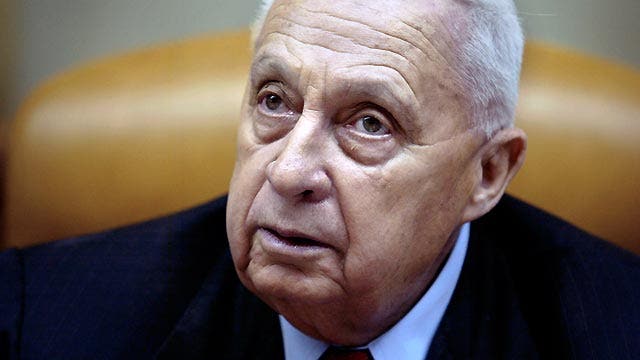Judith Miller on Ariel Sharon's 'grave' condition
Hospital says former Israeli prime minister's health is declining
President Obama expressed sorrow Saturday about the death of Israeli Prime Minister Ariel Sharon, joining other United States and world leaders in commenting on the life and passing of Sharon.
“On behalf of the American people, Michelle and I send our deepest condolences to the family of former Israeli Prime Minister Ariel Sharon and to the people of Israel on the loss of a leader who dedicated his life to the State of Israel,” the president said. “We reaffirm our unshakable commitment to Israel's security and our appreciation for the enduring friendship between our two countries and our two peoples.”
The former prime minister and general was at the height of his power when he suffered a stroke in 2006 and fell into an irreversible coma. He died Saturday at 85.
"Ariel Sharon is one of the most significant figures in Israeli history," said British Prime Minister David Cameron. "And as prime minister he took brave and controversial decisions in pursuit of peace, before he was so tragically incapacitated. Israel has today lost an important leader."
Sharon was "a brave soldier and a daring leader who loved his nation and his nation loved him," said President of the State of Israel Shimon Peres, a longtime friend and rival. "He was one of Israel's great protectors and most important architects, who knew no fear and certainly never feared vision."
Sharon died at Tel Hashomer hospital just outside Tel Aviv, where his family had gathered at his bedside over the past several days as his vital organs reportedly deteriorated.
“Ariel Sharon's journey was Israel’s journey,” Secretary of State John Kerry said. “The dream of Israel was the cause of his life, and he risked it all to live that dream. … During his years in politics, it is no secret that there were times the United States had differences with him. But whether you agreed or disagreed with his positions … you admired the man who was determined to ensure the security and survival of the Jewish State.”
Sharon, an iconic figure who fought in three wars before entering politics, was elected prime minister in 2001.
In the months leading up to his stroke, longtime hard-liner Sharon had shocked his political base by expelling Jewish settlers from 21 Gaza settlements and from four on the West Bank.
He also resigned as head of the Likud party and formed a new centrist party called Kadima ("Forward").
Sharon's longtime rival and current prime minister, Benjamin Netanyahu, was elected his replacement as head of Likud.
"Laura and I join our friends in Israel and around the world in mourning the loss,” said former President George W. Bush, commenting for himself and his wife. “He was a warrior for the ages and a partner in seeking security for the Holy Land and a better, peaceful Middle East.”
However, Sharon was loathed by many Palestinians as a bitter enemy who did his utmost to sabotage their independence hopes -- by leading military offensives against them in Lebanon, the West Bank and Gaza and a settlement drive on the lands they want for a state.
Word of his death elicited muted expressions of satisfaction. Some said they regret he wasn't held accountable for his actions during his lifetime.
"He wanted to erase the Palestinian people from the map," said Tawfik Tirawi, who served as Palestinian intelligence chief when Sharon was prime minister a decade ago. "He wanted to kill us, but at the end of the day, Sharon is dead and the Palestinian people are alive."
In the Gaza Strip, Khalil al-Haya, a leader in the Islamic militant group Hamas, said Sharon caused suffering to generations of Palestinians.
"After eight years, he is going in the same direction as other tyrants and criminals whose hands were covered with Palestinian blood," he said.
Sharon suffered a mild stroke in December 2005. A little more than two weeks later he suffered the massive, intra-cerebral hemorrhage from which he never recovered.
Sharon's deputy, Ehud Olmert, was elected prime minister two months later.
Sharon was born February 26, 1928, in the then-British Mandate of Palestine to a family of Lithuanian Jews. By the age of 10 he had entered the Zionist youth movement Hassadeh and later the Haganah, the military precursor to the Israel Defense Forces.
His military career flourished as he became a commander in the Israeli army, celebrated as a military strategist.
Sharon was an instrumental figure in the 1956 Suez War, the Six Day War of 1967, the Yom Kippur War of 1973 and as Minister of Defense directed the 1982 Lebanon War.
Sharon joined the Likud party after retiring from the military, serving in a number of ministerial posts and then as party leader in 2000 before becoming prime minister from 2001 to 2006.
Widowed twice, he is survived by his sons Gilad and Omri.
The Associated Press contributed to this report.





